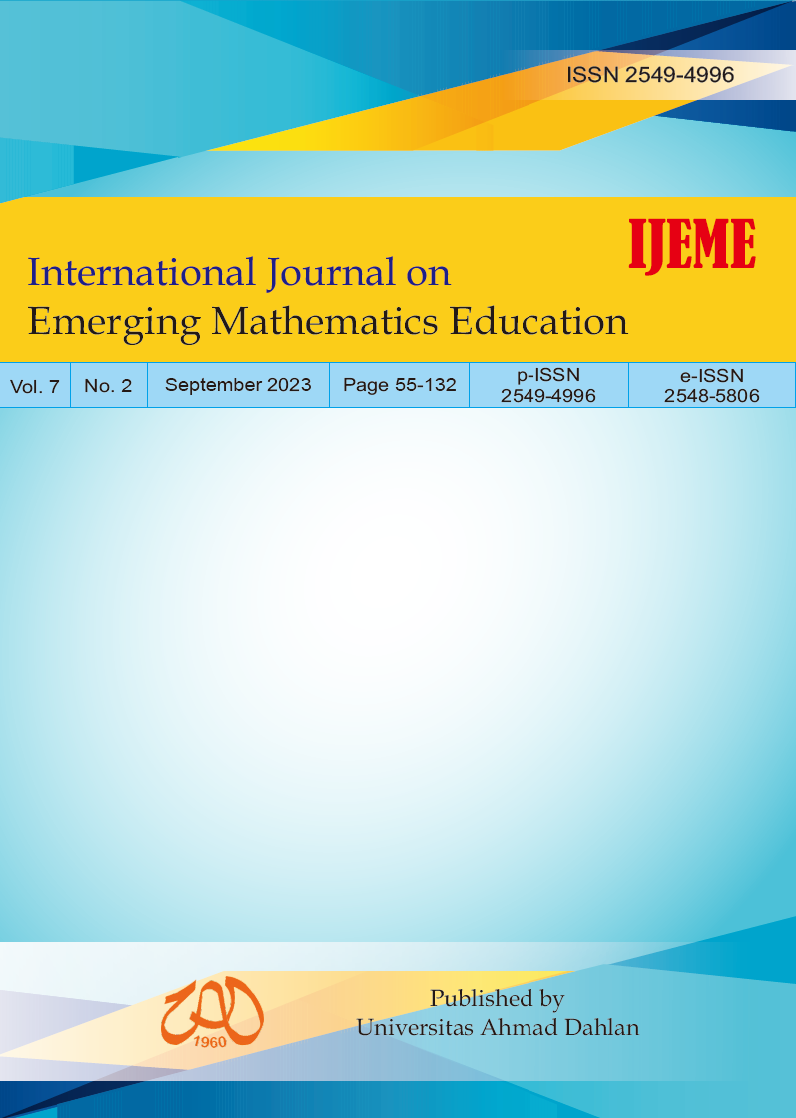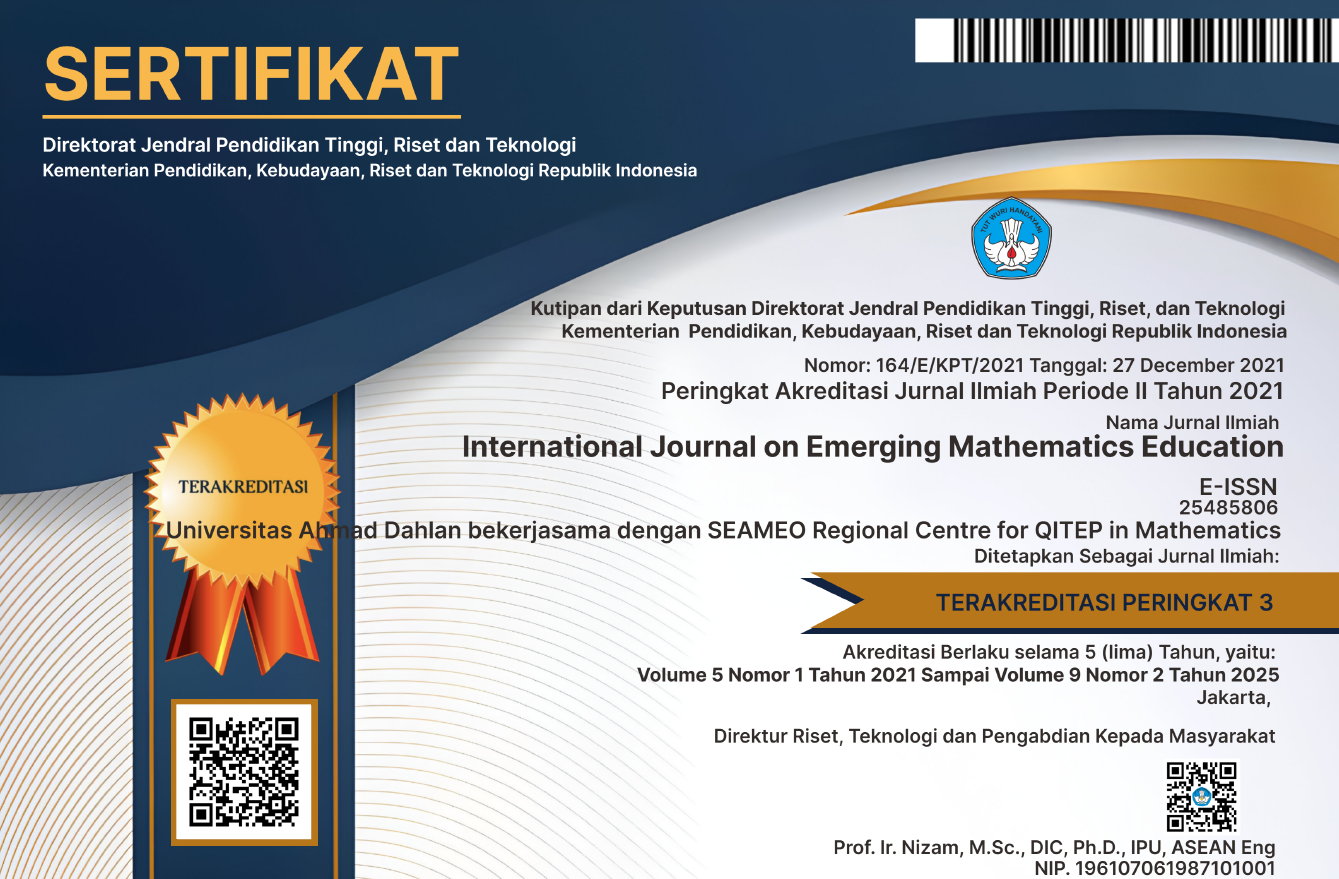Developing Edpuzzle-assisted e-Worksheet to Enhance Students' Critical Thinking Skills in Problem-based Learning
DOI:
https://doi.org/10.12928/ijeme.v7i2.29569Keywords:
e-worksheet, problem-based learning, social arithmeticAbstract
This study aims to produce an Edpuzzle-assisted mathematics e-worksheet that is feasible to improve the grade VII junior high school students’ critical thinking skills in problem-based learning. This study also aims to test the effectiveness of the e-worksheet in improving the critical thinking skills. It was a development research using 4D model (define, design, develop and disseminate). The results of this research show that the Edpuzzle-assisted mathematics e-worksheet is feasible to be used to improve the critical thinking skills of junior high school students in grade VII based on the validation of material experts, media experts, and students' responses. Furthermore, the e-worksheet is effective to improve the critical thinking skills of junior high school students in grade VII based on the results of gain score test with the category of increasing pre-test and post-test by 84.04%.References
Acharya, B. R. (2017). Factors affecting difficulties in learning mathematics by mathematics learners. International Journal of Elementary Education, 6(2), 8-15.
Aini, N. R., Syafril, S., Netriwati, N., Pahrudin, A., Rahayu, T., & Puspasari, V. (2019, February). Problem-based learning for critical thinking skills in mathematics. In Journal of Physics: Conference Series (Vol. 1155, No. 1, p. 012026). IOP Publishing.
Carmichael, M., Reid, A., & Karpicke, J. D. (2018). Assessing the impact of educational video on student engagement, critical thinking and learning. A SAGE white paper.
Caviglia Harris, J. (2016). Flipping the undergraduate economics classroom: Using online videos to enhance teaching and learning. Southern Economic Journal, 83(1), 321-331.
Oktavianingtyas, R., Trapsilasiwi, D., Murtikusuma, R. P., & A'yun, Q. (2020). Analysis of students’ critical thinking skills on social arithmetics with jumping task. In Journal of Physics: Conference Series (Vol. 1465, No. 1, p. 012070). IOP Publishing.
Macías Rivas, M. P. (2012). Stimulating critical thinking through mathematics word problems (Bachelor's thesis, Educacion).
Miner-Romanoff, K., Rae, A., & Zakrzewski, C. E. (2019). A holistic and multifaceted model for ill-structured experiential problem-based learning: Enhancing student critical thinking and communication skills. Journal of Problem Based Learning in Higher Education, 7(1).
Nadeak, B., & Naibaho, L. (2020). The Effectiveness of Problem-Based Learning on Students’ Critical Thinking. Jurnal Dinamika Pendidikan, 13(1), 1–7.
Seibert, S. A. (2021). Problem-based learning: A strategy to foster generation Z's critical thinking and perseverance. Teaching and Learning in Nursing, 16(1), 85-88.
Sharadgah, T. A. Al. (2014). Developing critical thinking skills through writing in an internet-based environment. Society for Information Technology & Teacher Education International Conference, 2178–2185. Association for the Advancement of Computing in Education (AACE).
van Alten, D. C., Phielix, C., Janssen, J., & Kester, L. (2020). Self-regulated learning support in flipped learning videos enhances learning outcomes. Computers & Education, 158, 104000.
Wale, B. D., & Bishaw, K. S. (2020). Effects of using inquiry-based learning on EFL students’ critical thinking skills. Asian-Pacific Journal of Second and Foreign Language Education, 5, 1-14.
Yew, E. H., & Goh, K. (2016). Problem-based learning: An overview of its process and impact on learning. Health professions education, 2(2), 75-79.
Zahroh, D. A., & Yuliani, Y. (2021). Pengembangan E-worksheet berbasis literasi sains untuk melatihkan keterampilan berpikir kritis peserta didik pada materi pertumbuhan dan perkembangan. Berkala Ilmiah Pendidikan Biologi (BioEdu), 10(3), 605-616.
Zhou, Z. (2018). An Empirical Study on the Influence of PBL Teaching Model on College Students' Critical Thinking Ability. English Language Teaching, 11(4), 15-20
Downloads
Published
How to Cite
Issue
Section
License
License and Copyright Agreement
In submitting the manuscript to the journal, the authors certify that:
- They are authorized by their co-authors to enter into these arrangements.
- The work described has not been formally published before, except in the form of an abstract or as part of a published lecture, review, thesis, or overlay journal. Please also carefully read the International Journal on Emerging Mathematics Education (IJEME) Author Guidelines at http://journal.uad.ac.id/index.php/IJEME/about/submissions#authorGuidelines
- That it is not under consideration for publication elsewhere,
- That its publication has been approved by all the author(s) and by the responsible authorities, tacitly or explicitly, of the institutes where the work has been carried out.
- They secure the right to reproduce any material that has already been published or copyrighted elsewhere.
- They agree to the following license and copyright agreement.
Copyright
Authors who publish with the International Journal on Emerging Mathematics Education (IJEME) agree to the following terms:
- Authors retain copyright and grant the journal the right of first publication with the work simultaneously licensed under a Creative Commons Attribution License (CC BY-SA 4.0) that allows others to share the work with an acknowledgment of the work's authorship and initial publication in this journal.
- Authors are able to enter into separate, additional contractual arrangements for the non-exclusive distribution of the journal's published version of the work (e.g., post it to an institutional repository or publish it in a book), with an acknowledgment of its initial publication in this journal.
- Authors are permitted and encouraged to post their work online (e.g., in institutional repositories or on their website) prior to and during the submission process, as it can lead to productive exchanges, as well as earlier and greater citation of published work.
![]()
Ciptaan disebarluaskan di bawah Lisensi Creative Commons Atribusi-BerbagiSerupa 4.0 Internasional.





